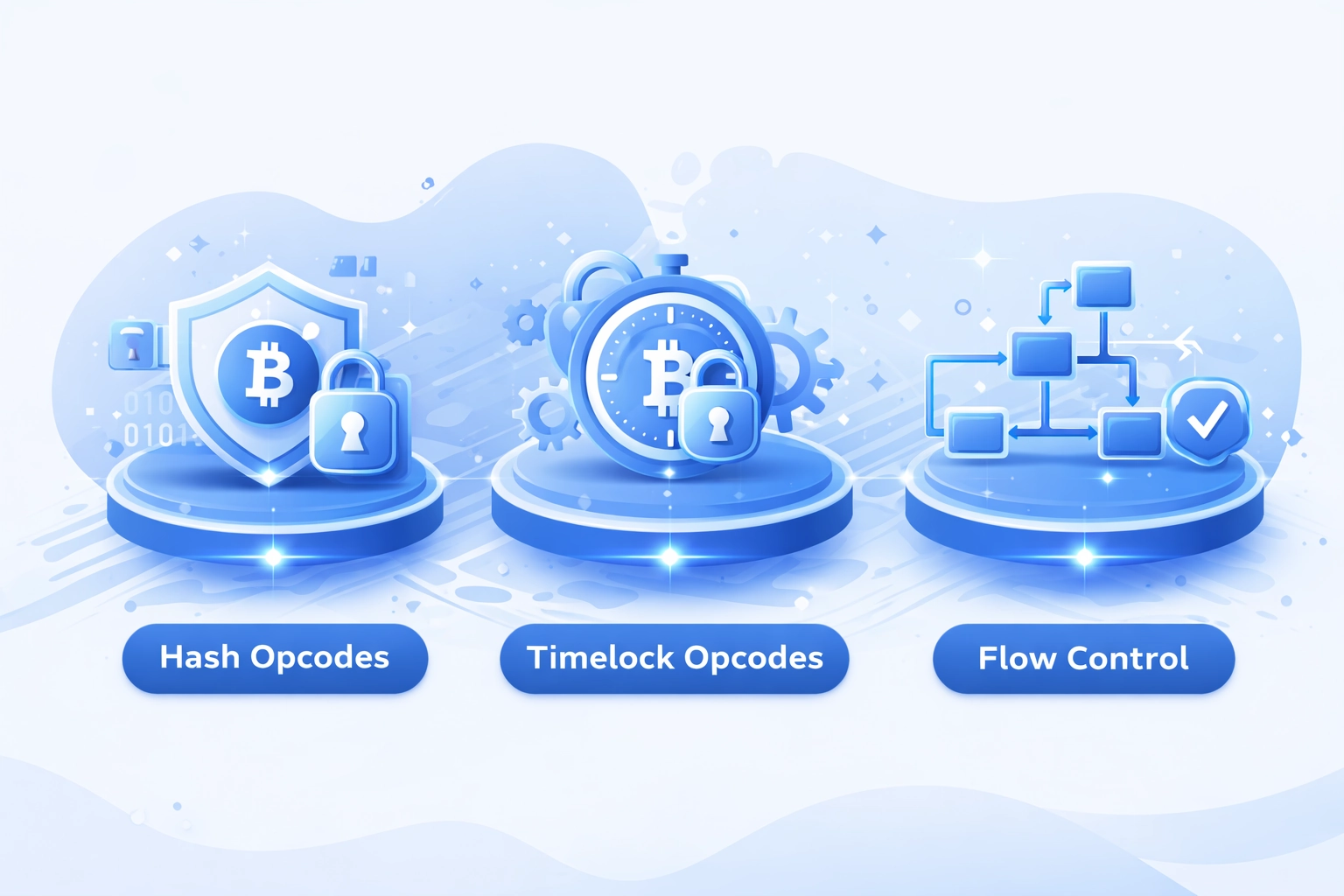Key Takeaways
- Atomic swap in Bitcoin enables trustless peer-to-peer cryptocurrency exchanges without requiring centralized intermediaries or custodial services.
- Hash Time-Locked Contracts form the cryptographic foundation ensuring either both parties complete the exchange or funds return automatically.
- Bitcoin Script opcodes including OP_HASH160 and OP_CHECKLOCKTIMEVERIFY provide the programmable logic powering Atomic Swap in Bitcoin execution.
- Cross-chain Atomic Swap in Bitcoin require compatible scripting capabilities on both blockchains to implement matching HTLC mechanisms properly.
- Security in Atomic Swap in Bitcoin derives from cryptographic hash preimages that simultaneously unlock funds on both participating blockchain networks.
- Timelock mechanisms protect participants by enabling automatic refunds if counterparties fail to complete their Atomic Swap in Bitcoin obligations.
- Atomic Swap in Bitcoin eliminate exchange custody risks, trading fees, and KYC requirements that centralized platforms impose on users.
- Liquidity fragmentation and counterparty discovery remain primary challenges limiting mainstream Atomic Swap in Bitcoin adoption in Bitcoin markets.
- Lightning Network integration promises faster Atomic Swap in Bitcoin with reduced on-chain footprint and lower transaction costs for users.
- Wallet and protocol support continues expanding across USA, UK, UAE, and Canada as Atomic Swap in Bitcoin infrastructure matures rapidly.
What Atomic Swap in Bitcoin Are and Why They Matter for Bitcoin
Atomic swap in Bitcoin represents a revolutionary mechanism enabling direct cryptocurrency exchanges between parties without intermediaries or trusted third parties. The term “atomic” refers to the indivisible nature of these transactions, meaning they either complete entirely or fail completely with no partial execution possible. This technology embodies the core principles of real estate tokenization and blockchain decentralization that Bitcoin was built upon.
The significance of Atomic Swap in Bitcoin extends beyond technical innovation to fundamental changes in how cryptocurrency markets can operate. Traditional exchanges require users to deposit funds, trust the platform’s security and solvency, and accept various fees and restrictions. Atomic Swap in Bitcoin eliminate these dependencies entirely, allowing peer-to-peer exchanges where participants maintain custody throughout the entire process.
For Bitcoin holders across USA, UK, UAE, and Canada, Atomic Swap in Bitcoin offer unprecedented freedom in managing their digital assets. Whether exchanging Bitcoin for Litecoin, Decred, or other compatible cryptocurrencies, users can execute trades directly from their wallets without exposing themselves to exchange hacks, frozen accounts, or regulatory interventions that have affected centralized platforms.
Hash Time-Locked Contracts as the Backbone of Atomic Swap in Bitcoin
Hash Time-Locked Contracts represent the ingenious cryptographic construction that makes Atomic Swap in Bitcoin possible. An HTLC combines two conditional elements: a hashlock requiring knowledge of a secret preimage to spend funds, and a timelock enabling refunds after a specified period. Together, these conditions create the atomic guarantee that defines this exchange mechanism.
The hashlock component uses cryptographic hash functions where one party generates a random secret and shares only its hash with the counterparty. Funds locked in the HTLC can only be claimed by revealing the original secret that produces this hash. Since cryptographic hash functions are one-way, knowing the hash reveals nothing about the secret itself.
Timelocks provide the safety mechanism ensuring funds cannot be permanently locked. If the Atomic Swap in Bitcoin does not complete within the specified timeframe, participants can reclaim their original funds. The initiator’s timelock is always longer than the responder’s, preventing scenarios where one party claims funds while the other’s refund window has already closed.
 How Bitcoin Scripts Power Atomic Swap in Bitcoin Execution
How Bitcoin Scripts Power Atomic Swap in Bitcoin Execution
Bitcoin’s scripting language provides the programmable foundation for implementing Atomic Swap in Bitcoin logic.
Hash Opcodes
- OP_SHA256 for hash generation
- OP_HASH160 for compact hashing
- OP_EQUAL for hash verification
- OP_EQUALVERIFY for conditional checks
Timelock Opcodes
- OP_CHECKLOCKTIMEVERIFY (CLTV)
- OP_CHECKSEQUENCEVERIFY (CSV)
- Absolute time constraints
- Relative time constraints
Flow Control
- OP_IF for conditional branches
- OP_ELSE for alternative paths
- OP_ENDIF for branch closure
- OP_RETURN for data embedding
Cross-Chain Compatibility in Bitcoin Atomic Swap in Bitcoin
Cross-chain Atomic Swap in Bitcoin require both participating blockchains to support compatible scripting capabilities. The fundamental requirements include hash function compatibility, timelock mechanisms, and similar transaction structures. Bitcoin’s scripting language serves as the reference implementation that other chains must match to enable Atomic Swap in Bitcoin.
| Blockchain | HTLC Support | Compatibility Level |
|---|---|---|
| Litecoin | Native HTLC | Excellent |
| Decred | Native HTLC | Excellent |
| Vertcoin | Native HTLC | Very Good |
| Ethereum | Smart Contract HTLC | Good (Adapter) |
| Monero | Specialized Protocol | Moderate |
Atomic Swap in Bitcoin Transaction Flow on the Bitcoin Network
1. Agreement Negotiation
Both parties agree on exchange rates, amounts, and timelock parameters before initiating the swap process.
2. Secret Generation
Initiator generates a cryptographically secure random secret and computes its SHA-256 hash for sharing.
3. First HTLC Creation
Initiator creates and broadcasts HTLC on Bitcoin locking their funds with the hash and longer timelock.
4. Second HTLC Creation
Responder verifies first HTLC then creates matching HTLC on counterparty chain with same hash, shorter timelock.
5. Secret Revelation
Initiator claims responder’s funds by revealing the secret preimage in their claim transaction on counterparty chain.
6. Counterparty Claim
Responder observes revealed secret on-chain and uses it to claim their funds from initiator’s Bitcoin HTLC.
7. Settlement Confirmation
Both claim transactions receive sufficient confirmations on their respective blockchains finalizing the atomic swap.
8. Swap Completion
Both parties now control their new assets with full custody, completing the trustless cross-chain exchange.
Security Model Behind Bitcoin Atomic Swap in Bitcoin
The security of atomic swaps rests on well-established cryptographic primitives rather than trust assumptions. SHA-256 hash functions provide computational hiding, making it infeasible to derive the secret from its hash. The discrete logarithm problem underlying Bitcoin’s signature scheme ensures only legitimate key holders can authorize transactions.
Game-theoretic incentives align participant behavior with honest execution. Neither party benefits from abandoning the swap midway since doing so results in paying transaction fees without receiving anything. The worst outcome for any participant is simply returning to their initial state after timelock expiration, minus minor transaction costs.
Network-level security inherits from Bitcoin’s proof-of-work consensus, providing probabilistic finality after sufficient confirmations.[1] Participants in USA, UK, UAE, and Canada markets can trust swap execution without relying on any central authority or counterparty reputation.
Failure Conditions and Refund Mechanisms in Atomic Swap in Bitcoin
Atomic swaps include robust failure handling ensuring participants never lose funds due to counterparty inaction. The primary failure scenario occurs when the responder never creates their HTLC after the initiator has locked funds. In this case, the initiator simply waits for their timelock to expire and reclaims their Bitcoin without any loss beyond transaction fees.
If the initiator fails to claim the responder’s funds before revealing the secret, the responder’s timelock expires first, allowing them to reclaim their assets. The initiator’s longer timelock ensures they can still recover their Bitcoin afterward. This asymmetric timelock structure prevents scenarios where one party loses access to both chains’ funds.
Network failures, wallet crashes, or connectivity issues during swap execution do not cause fund loss. Participants can resume the process once connectivity returns, or simply wait for timelocks to enable refunds. The on-chain nature of HTLCs means swap state persists independently of participant availability.
On-Chain Verification and Settlement Finality
On-chain verification in atomic swaps provides publicly auditable proof of exchange execution. Both HTLC creation and claim transactions are permanently recorded on their respective blockchains, creating an immutable audit trail. This transparency enables dispute resolution and builds confidence in the mechanism’s integrity.
| Verification Step | What It Confirms | Finality Level |
|---|---|---|
| HTLC Broadcast | Funds locked with correct parameters | Pending (0 confirmations) |
| First Confirmation | Transaction included in block | Probabilistic (low) |
| 3 Confirmations | Standard merchant acceptance | Probabilistic (medium) |
| 6 Confirmations | Exchange-grade finality | Probabilistic (high) |
| Claim Transaction | Secret revealed, swap complete | Final (irreversible) |
Atomic Swaps vs Wrapped and Bridged Bitcoin
Wrapped Bitcoin (WBTC) and bridge protocols offer alternative approaches to cross-chain Bitcoin utilization, but with significant tradeoffs. These solutions require trusting custodians who hold the underlying Bitcoin while issuing wrapped tokens and coin on other chains. Atomic swaps maintain true peer-to-peer exchange without introducing custodial intermediaries.
| Factor | Atomic Swaps | Wrapped Bitcoin |
|---|---|---|
| Custody Model | Self-custody throughout | Custodian holds BTC |
| Trust Requirement | Cryptographic only | Trust custodian solvency |
| Speed | 10-60 minutes | Minutes (minting/burning) |
| DeFi Compatibility | Limited to swap chains | Full EVM ecosystem access |
| Counterparty Risk | None | Custodian failure risk |
Scalability Considerations for Bitcoin Atomic Swaps
Selecting the right scaling approach depends on volume requirements, speed expectations, and security priorities.
On-Chain HTLCs
Traditional atomic swaps using on-chain transactions. Maximum security but limited throughput and higher fees during congestion.
Lightning HTLCs
Layer 2 atomic swaps with instant settlement and minimal fees. Requires channel liquidity on both networks.
Submarine Swaps
Bridge between on-chain and Lightning. Enables swaps between layer 1 and layer 2 Bitcoin seamlessly.
Batched Settlements
Aggregate multiple swaps into single transactions. Reduces per-swap costs but introduces settlement delays.
Sidechain Integration
Utilize Bitcoin sidechains for higher throughput swaps with periodic settlement to mainchain.
Hybrid Approaches
Combine multiple techniques based on trade size and urgency. Optimize for specific use cases dynamically.
Liquidity Challenges in Atomic Swap Markets
The most significant barrier to atomic swap adoption remains liquidity fragmentation. Unlike centralized exchanges with deep order books, atomic swaps require finding counterparties willing to trade specific amounts at agreeable rates. This peer discovery problem limits practical utility for users seeking immediate execution at competitive prices.
Decentralized order book protocols attempt to aggregate atomic swap liquidity but face bootstrapping challenges. Market makers hesitate to commit capital to illiquid venues, while traders avoid platforms lacking liquidity. Breaking this chicken-and-egg problem requires innovative incentive mechanisms and cross-platform liquidity aggregation.
Professional market makers increasingly recognize atomic swap opportunities, particularly for arbitrage between Bitcoin and Litecoin markets. As infrastructure matures and user interfaces improve, liquidity is gradually concentrating around leading protocols, improving execution quality for retail participants across global markets.
Wallet and Protocol Support for Bitcoin Atomic Swaps
Wallet integration remains crucial for mainstream atomic swap adoption. Technical complexity has historically limited swaps to command-line tools and developer-focused interfaces. Modern wallets are increasingly incorporating atomic swap functionality, making trustless exchanges accessible to average users without requiring deep technical understanding.
Leading atomic swap protocols include Decred’s DEX, Komodo’s AtomicDEX, and various open-source implementations. These platforms provide matching engines, counterparty discovery, and automated HTLC management. Users in USA, UK, UAE, and Canada increasingly access these services through browser extensions and mobile applications.
Hardware wallet support presents ongoing challenges due to the interactive nature of atomic swaps requiring multiple signing rounds. Solutions involving hardware wallet integration continue advancing, with some protocols now supporting Ledger and Trezor devices for atomic swap participation.
 Use Cases Driving Atomic Swap Adoption Today
Use Cases Driving Atomic Swap Adoption Today
Real-world applications demonstrate the practical value of atomic swap technology across diverse scenarios.
Privacy-Focused Trading
- KYC-free cryptocurrency exchanges
- Pseudonymous asset management
- Regulatory arbitrage strategies
- Personal financial privacy
Cross-Market Arbitrage
- Price discrepancy exploitation
- Decentralized market making
- Liquidity provision rewards
- Algorithmic trading strategies
Security-Conscious Users
- Exchange hack protection
- Self-custody maintenance
- Institutional risk management
- Cold storage diversification
Current Limitations Preventing Mass Adoption
Understanding these challenges helps set realistic expectations for atomic swap capabilities today.
Limitation 1: User experience complexity requires significant improvement before mainstream users can execute swaps confidently.
Limitation 2: Timelock requirements mean swaps cannot provide instant settlement that traders expect from centralized platforms.
Limitation 3: Chain compatibility restrictions limit swap pairs to cryptocurrencies supporting HTLC-like scripting capabilities.
Limitation 4: Liquidity fragmentation across protocols prevents competitive pricing compared to centralized exchange depth.
Limitation 5: On-chain transaction costs can make small swaps economically impractical during high fee periods.
Limitation 6: Online requirements during swap execution prevent truly offline or cold storage based atomic swaps.
Limitation 7: Counterparty discovery mechanisms remain primitive compared to centralized exchange matching engines.
Limitation 8: Regulatory uncertainty around decentralized exchange protocols creates compliance concerns for institutional adoption.
Future Evolution of Atomic Swaps in the Bitcoin Ecosystem
The atomic swap landscape continues evolving with technical innovations addressing current limitations. Taproot activation on Bitcoin enables more efficient and private HTLC constructions, reducing on-chain footprint and improving fungibility. Point Time-Locked Contracts (PTLCs) using Schnorr signatures promise enhanced privacy by eliminating hash reuse across chains.
Lightning Network integration represents perhaps the most transformative development for atomic swap scalability. Instant, low-cost swaps between Bitcoin Lightning and compatible networks could finally deliver the user experience competitive with centralized alternatives. Projects across USA, UK, UAE, and Canada are actively building this cross-chain Lightning infrastructure.
Discreet Log Contracts and adaptor signatures enable even more sophisticated atomic exchange patterns, including options, futures, and conditional payments. These primitives extend atomic swap principles beyond simple asset exchanges into complex financial instruments, all maintaining the trustless guarantees that make Bitcoin valuable.
Atomic Swap Security and Compliance Checklist
Pre-Swap Verification
- Verify counterparty HTLC parameters
- Confirm hash matches expected value
- Check timelock sufficiency margins
Transaction Security
- Use secure secret generation
- Protect preimage until claim
- Monitor both chains continuously
Refund Preparation
- Prepare refund transaction early
- Set fee rate appropriately
- Track timelock expiration closely
Post-Swap Actions
- Verify claim confirmation depth
- Document transaction for records
- Securely delete used secrets
Build Trustless Bitcoin Exchange Solutions with Our Expert Team!
Partner with our blockchain specialists who have delivered 200+ successful projects across USA, UK, UAE, and Canada cryptocurrency markets.
Frequently Asked Questions
An atomic swap in Bitcoin is a peer-to-peer cryptocurrency exchange mechanism that allows users to trade Bitcoin directly with other cryptocurrencies without intermediaries. The process uses Hash Time-Locked Contracts (HTLCs) to ensure both parties fulfill their obligations simultaneously or the transaction automatically reverses. This trustless exchange eliminates counterparty risk while maintaining full custody of assets throughout the swap process.
Atomic swaps provide exceptional security for Bitcoin trading through cryptographic guarantees rather than trust-based systems. The HTLC mechanism ensures that either both parties receive their agreed-upon assets or neither does, eliminating the possibility of one-sided fraud. However, users must understand timelock parameters and ensure proper wallet compatibility. When executed correctly, atomic swaps represent one of the safest methods for exchanging Bitcoin across different blockchain networks.
Bitcoin atomic swaps work with cryptocurrencies that support similar scripting capabilities, particularly those implementing Hash Time-Locked Contracts. Compatible chains include Litecoin, Decred, Vertcoin, and other Bitcoin-derived cryptocurrencies. Some newer protocols enable swaps with Ethereum-based tokens through specialized adapters. The key requirement is that both blockchains must support the cryptographic hash functions and timelock mechanisms necessary for HTLC execution.
Bitcoin atomic swap completion times vary based on blockchain confirmation requirements and timelock settings. Typical swaps require 1-6 Bitcoin confirmations, taking approximately 10-60 minutes under normal network conditions. Cross-chain swaps involving slower networks may take longer. The timelock periods, which provide refund protection, typically range from 24-48 hours, though the actual exchange completes much faster when both parties cooperate promptly.
Atomic swaps offer significant advantages including complete custody retention, elimination of exchange hacks risk, enhanced privacy without KYC requirements, and removal of trading fees charged by centralized platforms. Users in USA, UK, UAE, and Canada particularly benefit from avoiding regulatory complications and maintaining direct control over their assets. The trustless nature ensures fair exchanges without relying on third-party integrity or solvency.
Reviewed & Edited By

Aman Vaths
Founder of Nadcab Labs
Aman Vaths is the Founder & CTO of Nadcab Labs, a global digital engineering company delivering enterprise-grade solutions across AI, Web3, Blockchain, Big Data, Cloud, Cybersecurity, and Modern Application Development. With deep technical leadership and product innovation experience, Aman has positioned Nadcab Labs as one of the most advanced engineering companies driving the next era of intelligent, secure, and scalable software systems. Under his leadership, Nadcab Labs has built 2,000+ global projects across sectors including fintech, banking, healthcare, real estate, logistics, gaming, manufacturing, and next-generation DePIN networks. Aman’s strength lies in architecting high-performance systems, end-to-end platform engineering, and designing enterprise solutions that operate at global scale.







